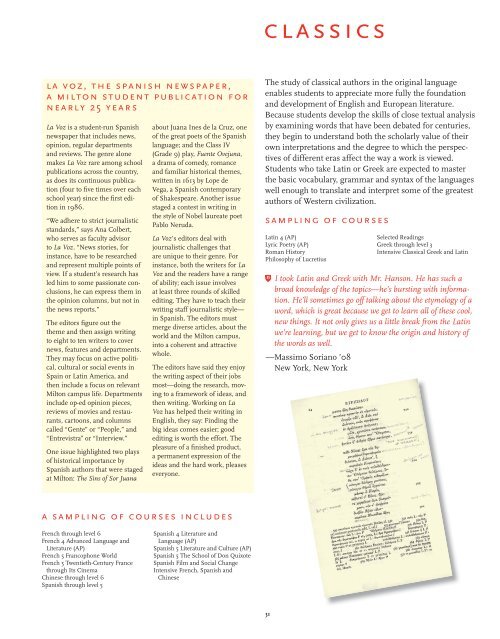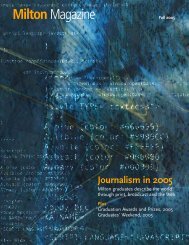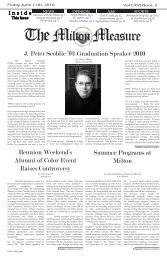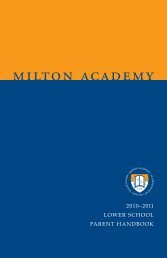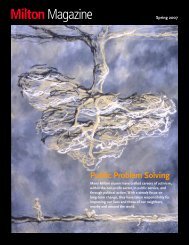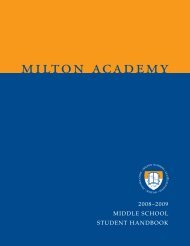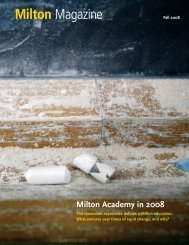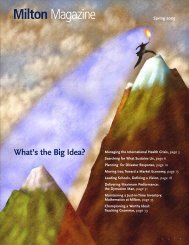Contents - Milton Academy
Contents - Milton Academy
Contents - Milton Academy
- No tags were found...
You also want an ePaper? Increase the reach of your titles
YUMPU automatically turns print PDFs into web optimized ePapers that Google loves.
classicsla voz, the spanish newspaper,a milton student publication fornearly 25 yearsLa Voz is a student-run Spanishnewspaper that includes news,opinion, regular departmentsand reviews. The genre alonemakes La Voz rare among schoolpublications across the country,as does its continuous publication(four to five times over eachschool year) since the first editionin 1986.“We adhere to strict journalisticstandards,” says Ana Colbert,who serves as faculty advisorto La Voz. “News stories, forinstance, have to be researchedand represent multiple points ofview. If a student’s research hasled him to some passionate conclusions,he can express them inthe opinion columns, but not inthe news reports.”The editors figure out thetheme and then assign writingto eight to ten writers to covernews, features and departments.They may focus on active political,cultural or social events inSpain or Latin America, andthen include a focus on relevant<strong>Milton</strong> campus life. Departmentsinclude op-ed opinion pieces,reviews of movies and restaurants,cartoons, and columnscalled “Gente” or “People,” and“Entrevistra” or “Interview.”One issue highlighted two playsof historical importance bySpanish authors that were stagedat <strong>Milton</strong>: The Sins of Sor Juanaabout Juana Ines de la Cruz, oneof the great poets of the Spanishlanguage; and the Class IV(Grade 9) play, Fuente Ovejuna,a drama of comedy, romanceand familiar historical themes,written in 1613 by Lope deVega, a Spanish contemporaryof Shakespeare. Another issuestaged a contest in writing inthe style of Nobel laureate poetPablo Neruda.La Voz’s editors deal withjournalistic challenges thatare unique to their genre. Forinstance, both the writers for LaVoz and the readers have a rangeof ability; each issue involvesat least three rounds of skilledediting. They have to teach theirwriting staff journalistic style—in Spanish. The editors mustmerge diverse articles, about theworld and the <strong>Milton</strong> campus,into a coherent and attractivewhole.The editors have said they enjoythe writing aspect of their jobsmost—doing the research, movingto a framework of ideas, andthen writing. Working on LaVoz has helped their writing inEnglish, they say: Finding thebig ideas comes easier; goodediting is worth the effort. Thepleasure of a finished product,a permanent expression of theideas and the hard work, pleaseseveryone.The study of classical authors in the original languageenables students to appreciate more fully the foundationand development of English and European literature.Because students develop the skills of close textual analysisby examining words that have been debated for centuries,they begin to understand both the scholarly value of theirown interpretations and the degree to which the perspectivesof different eras affect the way a work is viewed.Students who take Latin or Greek are expected to masterthe basic vocabulary, grammar and syntax of the languageswell enough to translate and interpret some of the greatestauthors of Western civilization.sampling of coursesLatin 4 (AP)Lyric Poetry (AP)Roman HistoryPhilosophy of LucretiusSelected ReadingsGreek through level 3Intensive Classical Greek and LatinI took Latin and Greek with Mr. Hanson. He has such abroad knowledge of the topics—he’s bursting with information.He’ll sometimes go off talking about the etymology of aword, which is great because we get to learn all of these cool,new things. It not only gives us a little break from the Latinwe’re learning, but we get to know the origin and history ofthe words as well.— Massimo Soriano ’08New York, New Yorka sampling of courses includesFrench through level 6French 4 Advanced Language andLiterature (AP)French 5 Francophone WorldFrench 5 Twentieth-Century Francethrough Its CinemaChinese through level 6Spanish through level 5Spanish 4 Literature andLanguage (AP)Spanish 5 Literature and Culture (AP)Spanish 5 The School of Don QuixoteSpanish Film and Social ChangeIntensive French, Spanish andChinese31


